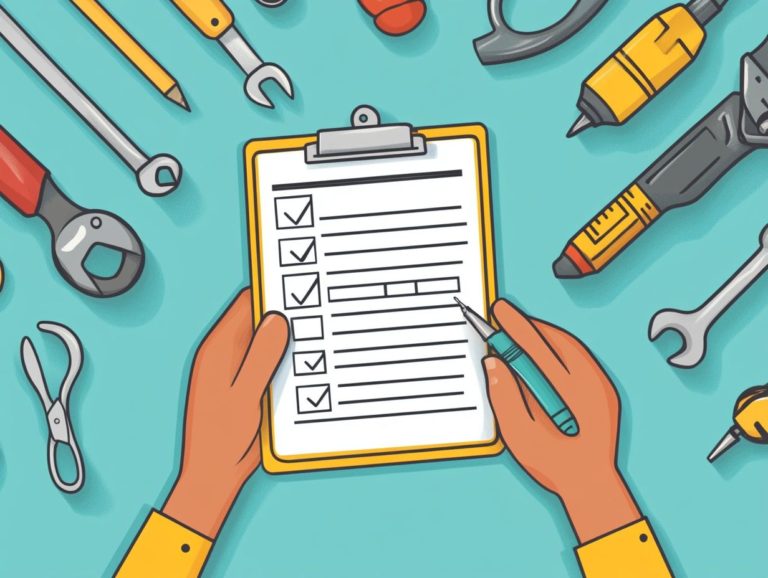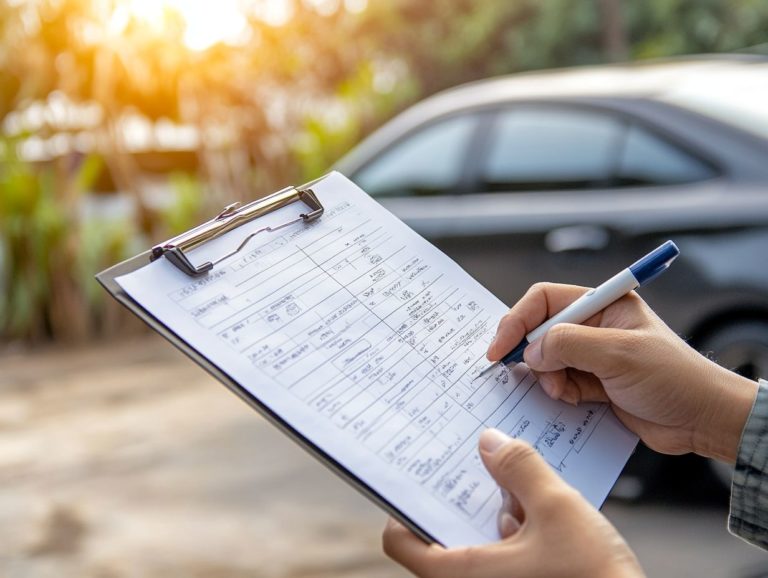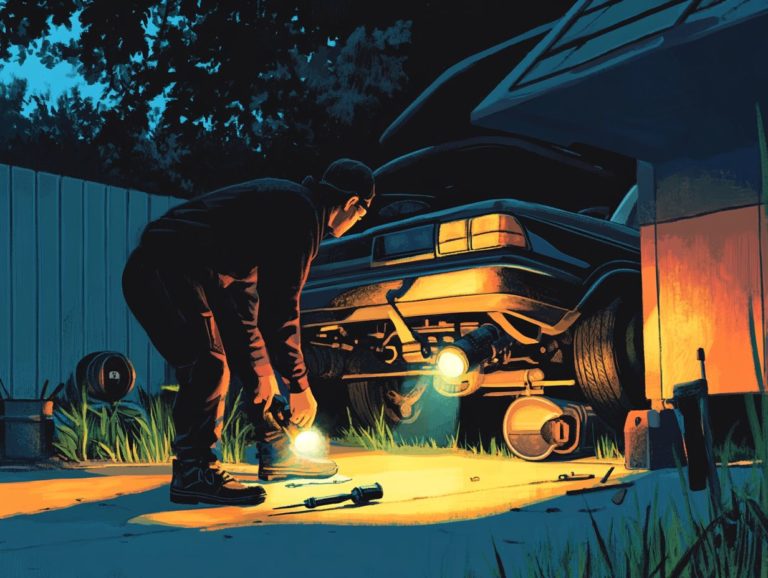What to Check for in a Car’s Fuel System
A car’s fuel system is crucial for optimal performance and efficiency. It delivers power directly to the engine.
By understanding how this system operates, recognizing potential issues, and familiarizing yourself with its key components, you can save time and money in the long run.
This article explores how a fuel system works, highlights common signs of trouble, and offers valuable tips for maintenance and troubleshooting.
Whether you re a passionate car enthusiast or an everyday driver, mastering these insights will help keep your vehicle running smoothly.
Contents
- Key Takeaways:
- The Importance of a Car’s Fuel System
- Signs of a Faulty Fuel System
- Components of a Car’s Fuel System
- Regular Maintenance for the Fuel System
- Troubleshooting and Repairing the Fuel System
- Frequently Asked Questions
- What components should I check for in a car’s fuel system?
- How often should I check the fuel system in my car?
- What are some signs of a potential issue with the fuel system?
- What could be causing a fuel system malfunction in my car?
- Can I check the fuel system in my car by myself?
- How much does it typically cost to repair a fuel system issue in a car?
Key Takeaways:
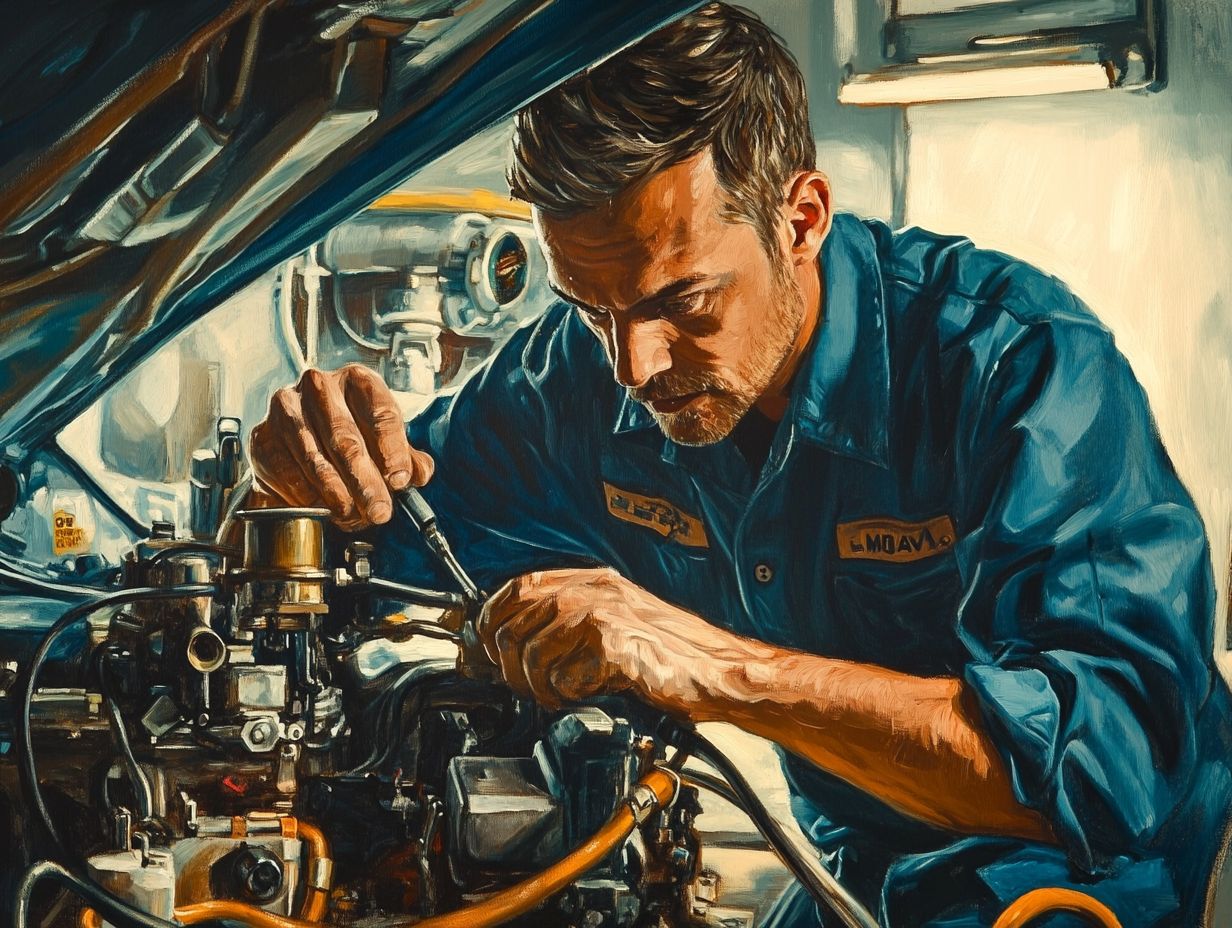
Regularly maintaining your car’s fuel system can save you from expensive repairs. Watch for signs like poor fuel efficiency, engine stalling, and unusual noises.
Key components of a fuel system include the fuel tank, fuel pump, filter, and injectors. It’s important to check and replace these parts as needed.
The Importance of a Car’s Fuel System
The fuel system plays an essential role in optimal engine performance. It delivers the right amount of fuel to the engine, whether it runs on gasoline or diesel.
A well-functioning fuel system enhances fuel economy and reduces harmful emissions, contributing to environmental preservation. Neglecting this crucial maintenance can lead to serious performance issues.
How the Fuel System Works
The fuel system consists of several components: the fuel pump, fuel tank, fuel lines, and fuel injectors. Together, they ensure that fuel reaches the engine efficiently.
The fuel tank holds gasoline, acting as a ready supply. The fuel pump transfers that fuel from the tank to the engine. Think of the fuel lines as arteries, channeling the fuel and maintaining high pressure as it travels.
Once the fuel reaches the injectors, they atomize it and deliver it precisely into the combustion chamber for ignition. Mechanical pumps rely on the engine’s motion, while electric pumps use electrical energy to create suction.
This modern delivery method ensures you get the most out of your drive.
Signs of a Faulty Fuel System
Recognizing signs of a faulty fuel system is vital for maintaining your vehicle’s performance and avoiding expensive repairs. Watch for symptoms like:
- The check engine light glowing on your dashboard
- Extended cranking before the engine starts
- Unusual noises during operation
If you notice engine stalling, a loss of power, or a persistent fuel smell, address these issues immediately to prevent further damage.
Common Symptoms to Look Out For
If your engine won t start, stalls unexpectedly, or struggles to maintain steady fuel pressure, it s time to check the fuel system. These issues can arise from various problems, like a clogged fuel filter, a faulty fuel pump, or issues with the fuel injectors.
A blocked fuel filter can obstruct fuel flow, while an unreliable fuel pump can create inadequate pressure, causing your engine to stutter. Use a pressure tester by connecting it to the fuel rail to monitor consistent readings. Low or fluctuating pressures indicate a leak or blockage in the lines.
Addressing these symptoms promptly is crucial; neglecting them could lead to serious engine troubles later on. Regular maintenance and thorough checks are key to preventing complications and ensuring your vehicle remains reliable on the road.
Components of a Car’s Fuel System
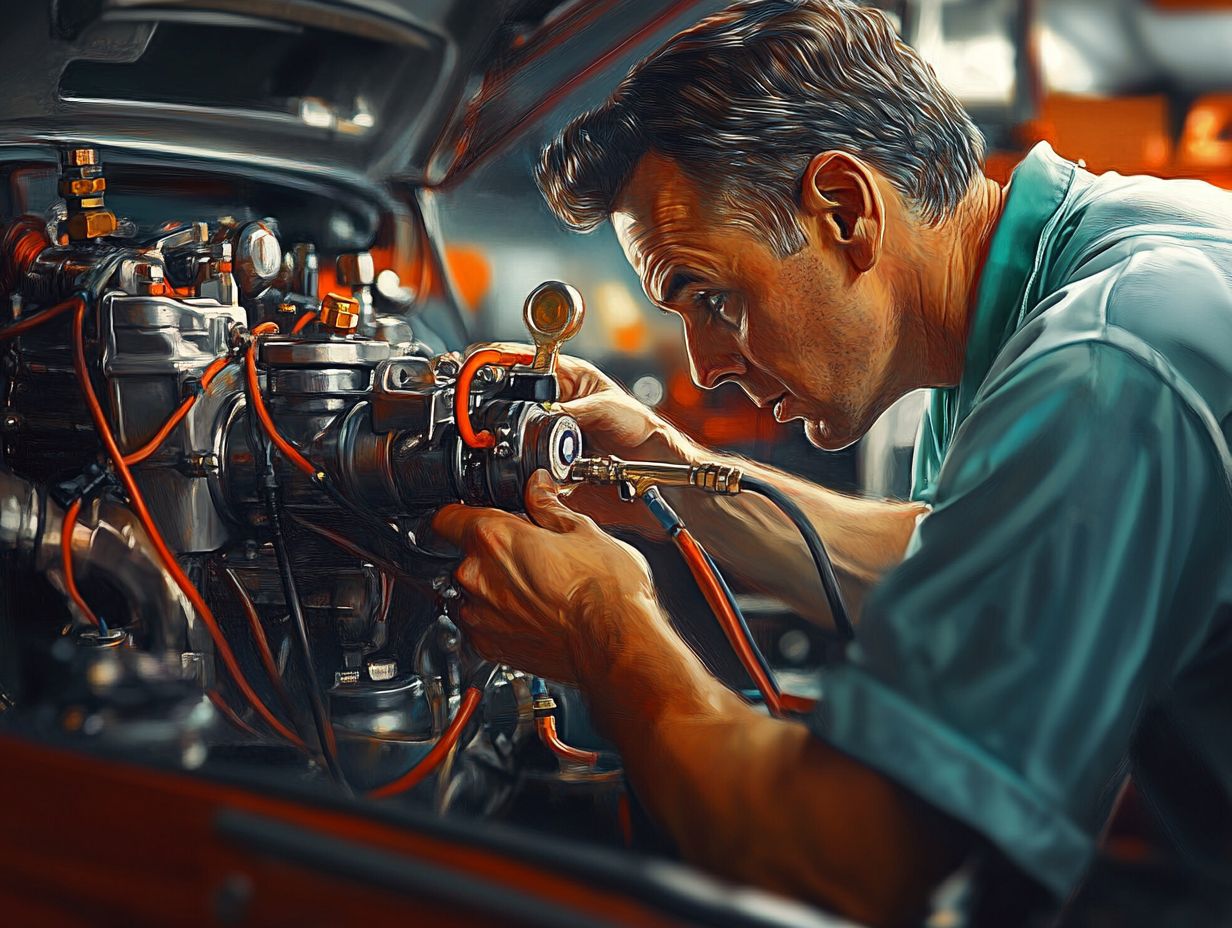
A car’s fuel system consists of several essential components:
- The fuel tank
- Fuel lines
- Fuel pump
- Fuel filter
- Fuel injectors
Each of these elements plays a crucial role in ensuring that fuel is delivered efficiently to the engine. This delivery enables optimal performance and reliability.
Fuel Tank and Fuel Lines
The fuel tank acts as your car’s reservoir for fuel. The fuel lines are the pathways that deliver this vital resource to the engine, maintaining the right pressure.
The seamless operation of these components is crucial for your vehicle’s performance. Over time, fuel tanks can corrode or develop leaks. Fuel lines may crack or become blocked due to dirt and debris buildup.
These issues disrupt fuel delivery and can lead to decreased fuel efficiency and increased emissions, affecting both the environment and your wallet.
Regular maintenance is key to sidestepping these common pitfalls. Inspections, cleaning of fuel filters, and timely replacement of worn parts ensure a reliable fuel system that operates smoothly.
Fuel Pump and Fuel Filter
The fuel pump, whether mechanical or electric, maintains fuel pressure and ensures efficient delivery to the engine. Meanwhile, the fuel filter removes dirt and debris that could clog the system.
In most vehicles, these components work in perfect harmony to enhance engine performance and fuel efficiency. Understanding the different types of fuel pumps, such as diaphragm pumps and electric pumps, can assist you in troubleshooting issues.
Regularly replacing these parts is crucial. A failing pump can lead to insufficient fuel pressure, causing the engine to stall. A dirty filter can restrict fuel flow, resulting in performance drops.
Committing to proactive maintenance ensures that the fuel delivery system remains clean and effective, preventing costly repairs in the future.
Fuel Injectors and Carburetor
Fuel injectors deliver the precise amount of fuel to your engine. A carburetor, found in older vehicles, is a device that mixes air and fuel for combustion.
These two systems represent distinct approaches to fuel delivery. Fuel injectors spray fuel directly into the combustion chamber, optimizing performance and enhancing fuel efficiency.
In contrast, carburetors create a vacuum that draws in fuel, often leading to less precise control over the air-fuel mixture. While modern vehicles equipped with fuel injectors enjoy improved power and reduced emissions, carbureted engines may struggle with consistency.
Regular Maintenance for the Fuel System
Regular maintenance of the fuel system is crucial. Ensure that every component, from the fuel filter to the fuel lines, operates at peak efficiency. Prioritizing this upkeep prolongs your vehicle’s life and enhances its overall performance.
Recommended Service Intervals
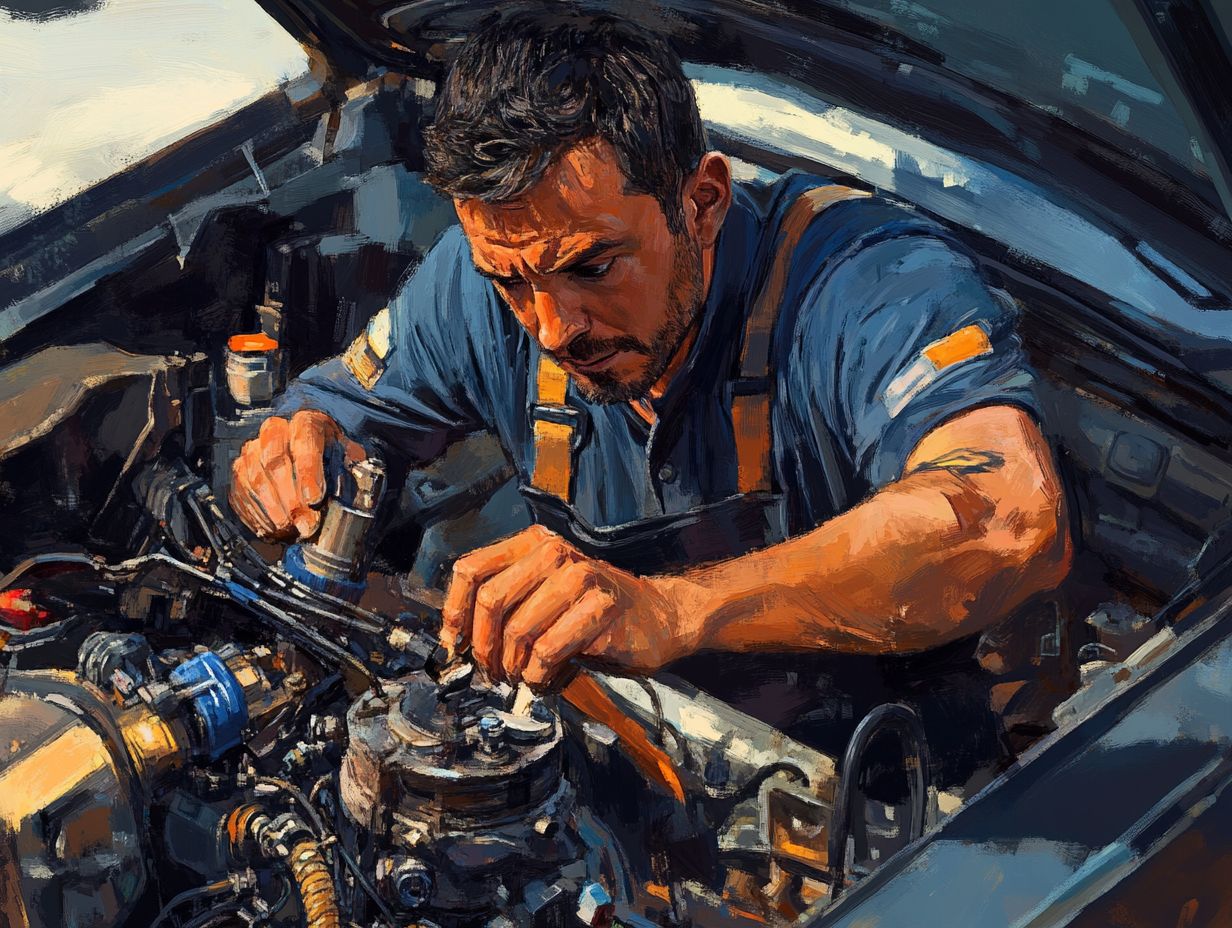
Following recommended service intervals for your fuel system components, such as the fuel filter and fuel pump, is essential to avoiding potential issues from neglect.
Routine maintenance ensures optimal vehicle performance and extends the lifespan of these vital parts. For example:
- Replace the fuel filter every 15,000 miles.
- Inspect the fuel pump annually to identify potential problems.
Ignoring these guidelines could lead to costly repairs and inconvenient breakdowns. Stick to a disciplined maintenance schedule for your fuel system.
Don’t wait until your fuel system fails! Schedule your maintenance or check your fuel system now to avoid future problems.
Troubleshooting and Repairing the Fuel System
When you embark on troubleshooting and repairing the fuel system, it’s essential to carefully check any issues that may arise, such as fuel leaks, pump malfunctions, and pressure inconsistencies.
Using tools like a pressure tester a tool that measures the pressure of fuel in the system you can effectively check the pressure in the fuel lines. This ensures a thorough and precise approach to resolving these potential problems.
Steps to Diagnose and Fix Issues
Diagnosing and fixing issues within the fuel system calls for a systematic approach. Start with an accurate pressure reading and the right expert mechanic tools for precise analysis.
Start troubleshooting by inspecting the fuel lines for visible leaks or damage that could hinder flow. Then, use a fuel pressure gauge to measure the system s pressure; any deviations from the manufacturer s specifications might signal underlying problems, like a failing fuel pump or clogged filters.
Don t forget to check the electrical connections to the fuel injectors and ensure that the fuel filter is clean. Each of these steps is vital for pinpointing issues that could compromise engine performance and efficiency. Don t wait check your fuel system now to prevent bigger issues later!
Frequently Asked Questions
Here s what you need to know!
What components should I check for in a car’s fuel system?
You should check for the fuel pump, fuel filter, fuel injectors, fuel pressure regulator, and fuel lines in a car’s fuel system.
Got questions? We ve got answers!
How often should I check the fuel system in my car?
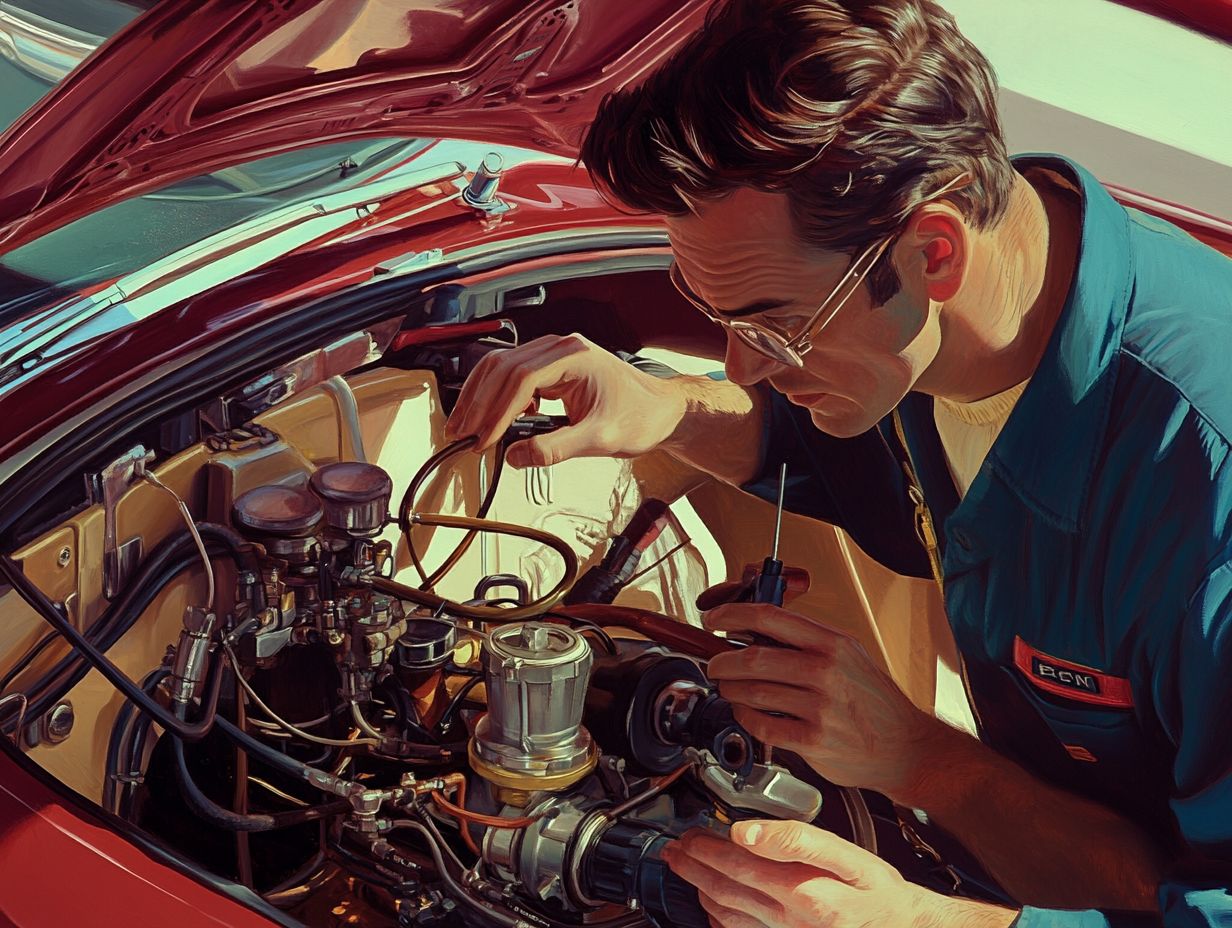
It is recommended to check the fuel system in your car at least once a year or every 10,000 miles, whichever comes first.
What are some signs of a potential issue with the fuel system?
Some signs of a potential issue with the fuel system include difficulty starting the car, reduced fuel efficiency, engine sputtering or stalling, and a strong odor of gasoline.
What could be causing a fuel system malfunction in my car?
A fuel system malfunction can be caused by a variety of factors including a clogged fuel filter, a faulty fuel pump, a damaged fuel line, or contaminated fuel.
Can I check the fuel system in my car by myself?
While it is possible to check some components of the fuel system yourself, it is recommended to have a professional mechanic perform a thorough inspection to ensure all components are functioning properly.
How much does it typically cost to repair a fuel system issue in a car?
The cost of repairing a fuel system issue can vary depending on the specific problem and the make and model of the car. On average, repairs for a fuel system issue can range from $200 to $800.

